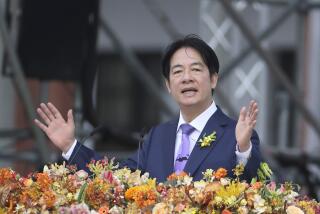China Missile Exercises Near Taiwan Also Test of Fortitude
BEIJING — This is just a test. . . .
That’s what China, in effect, said when it announced that it will launch missiles in Taiwan’s direction starting this week as part of a routine military exercise.
But the missiles are also designed to test Taiwan’s fortitude in its campaign for international recognition, analysts and diplomats say.
Tests of the surface-to-surface long-range missiles--which have the theoretical capability of traveling enough distance to hit targets in the United States when launched from Chinese soil--will start Friday and continue for a week. The exercise zone is about 85 miles away from Taiwan’s northern tip, and the Chinese government has warned all vessels and aircraft to stay clear of the area.
“It’s as much a political exercise as a military exercise,” says Tai Ming Cheung, a China analyst who tracks Chinese defense forces. “China is very aware that testing missiles that close to Taiwan sends a strong political message.”
The news that archrival China is pointing missiles its way has, indeed, pushed Taiwan’s panic buttons:
* The stock market in Taipei fell 4.23% on Wednesday, hitting a 19-month low.
* Taiwanese investors are saying they won’t put more money in a hostile country--meaning China.
* A novel called “T-Day, “ predicting a Chinese invasion of the Kuomintang-held island this summer, is a bestseller.
Accusing China of trying to foment social instability, Taiwanese Defense Minister Chiang Chung-ling said: “We should not create nervousness and panic because instability in society is what they hope for.”
“It’s psychological warfare,” another Taiwanese government official said.
The missile tests, part of a yearlong series of exercises, are targeted at halting President Lee Teng-hui’s bid for diplomatic recognition.
China has regarded Taiwan as a renegade province since Nationalist leaders fled there after the 1949 civil war. And Beijing won’t give up the option of using military force to reclaim Taiwan.
The United States does not officially recognize Taiwan, despite growing pressure from Congress. But President Lee recently stretched the limits of its relationship with the United States with his private visit to receive an honorary degree at his alma mater, Cornell University, in New York. The visit won prestige for Lee but infuriated Beijing.
Since June, Washington and Beijing have recalled their ambassadors and locked horns over alleged Chinese sales of missile parts to Iran and, most recently, the detention of California-based human rights activist Harry Wu.
Taiwan is also feeling the fallout. China first flexed its muscles with a small-scale military exercise off its eastern coast after Lee’s visit, then canceled high-level Beijing-Taipei talks scheduled for this month.
Undeterred, Lee has said he would like to visit Japan this summer, along with other national leaders, for the Osaka meeting of the Asia-Pacific Economic Cooperation group. “You cannot allow people to draw a circle and tell you to stay in it or be punished,” says government spokesman Jason Hu.
Taiwan holds one trump card: money. Taiwanese already invest an estimated $20 billion in mainland China, says the Taiwanese government. And in exchange for entry to the United Nations, Lee’s administration has offered $1 billion to assist underdeveloped nations.
The timing of China’s missile tests, however, sends a message to the United States, as well. The exercises come just before a meeting in Brunei of the Assn. of Southeast Asian Nations, where U.S. Secretary of State Warren Christopher and Chinese Foreign Minister Qian Qichen will try to put Beijing-Washington relations back on track.
More to Read
Sign up for Essential California
The most important California stories and recommendations in your inbox every morning.
You may occasionally receive promotional content from the Los Angeles Times.










